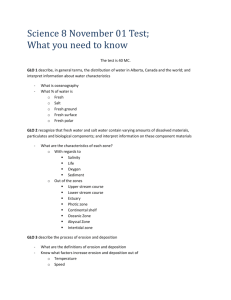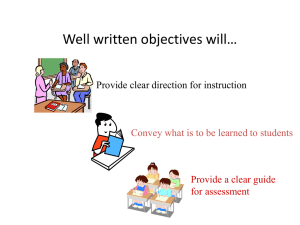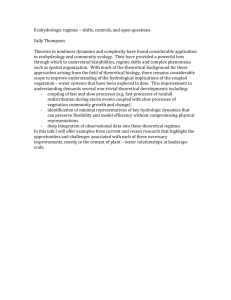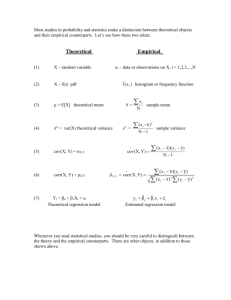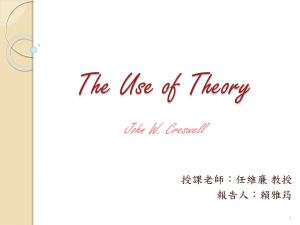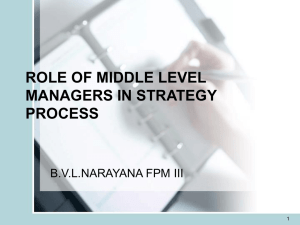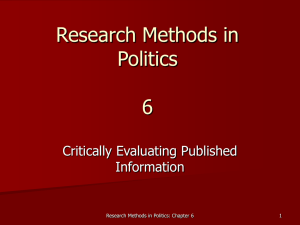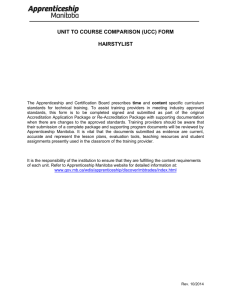MODULE SPECIFICATION TEMPLATE
advertisement
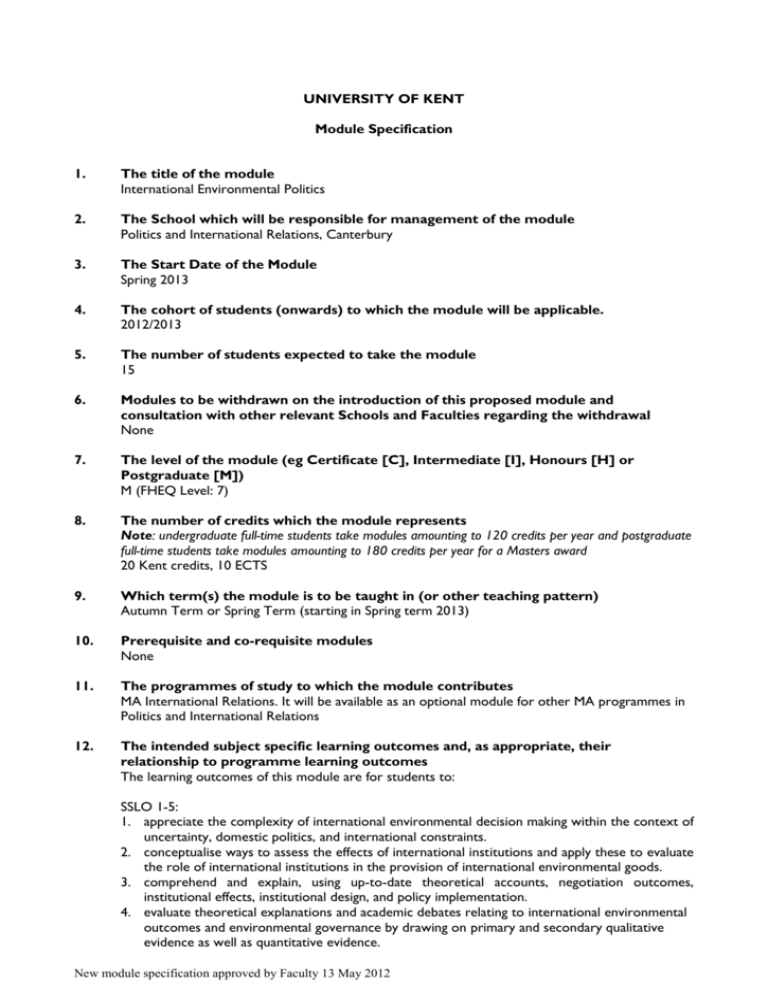
UNIVERSITY OF KENT Module Specification 1. The title of the module International Environmental Politics 2. The School which will be responsible for management of the module Politics and International Relations, Canterbury 3. The Start Date of the Module Spring 2013 4. The cohort of students (onwards) to which the module will be applicable. 2012/2013 5. The number of students expected to take the module 15 6. Modules to be withdrawn on the introduction of this proposed module and consultation with other relevant Schools and Faculties regarding the withdrawal None 7. The level of the module (eg Certificate [C], Intermediate [I], Honours [H] or Postgraduate [M]) M (FHEQ Level: 7) 8. The number of credits which the module represents Note: undergraduate full-time students take modules amounting to 120 credits per year and postgraduate full-time students take modules amounting to 180 credits per year for a Masters award 20 Kent credits, 10 ECTS 9. Which term(s) the module is to be taught in (or other teaching pattern) Autumn Term or Spring Term (starting in Spring term 2013) 10. Prerequisite and co-requisite modules None 11. The programmes of study to which the module contributes MA International Relations. It will be available as an optional module for other MA programmes in Politics and International Relations 12. The intended subject specific learning outcomes and, as appropriate, their relationship to programme learning outcomes The learning outcomes of this module are for students to: SSLO 1-5: 1. appreciate the complexity of international environmental decision making within the context of uncertainty, domestic politics, and international constraints. 2. conceptualise ways to assess the effects of international institutions and apply these to evaluate the role of international institutions in the provision of international environmental goods. 3. comprehend and explain, using up-to-date theoretical accounts, negotiation outcomes, institutional effects, institutional design, and policy implementation. 4. evaluate theoretical explanations and academic debates relating to international environmental outcomes and environmental governance by drawing on primary and secondary qualitative evidence as well as quantitative evidence. New module specification approved by Faculty 13 May 2012 5. be able to evaluate policy debates relating to key issues in international environmental politics and articulate policy solutions by bringing both evidence and theoretical reasoning to bear on the problems. PLO Advanced knowledge and understanding of: A1. historical and theoretical issues at the forefront of the discipline of international relations, together with familiarity with appropriate bibliographical sources (SSLO 2; 3; 4; ); A2. the epistemological and methodological principles in their application to the study of international relations (SSLO 2; ); A3. key ontological, theoretical, and methodological problems of international relations (SSLO 2; 3; 4; ); A4. current challenges to international order, cooperation, identity, social formations, and global issues, and possible strategies to address them (SSLO 1; 2; 3; 5); A5. the changing role of the state in the context of globalisation and regional integration and the implications for international peace and security (SSLO 1; 3; 5); A6. how to carry out an independent research project and write in a scholarly manner demonstrating familiarity with academic conventions deal with complex issues both systematically and creatively, make sound judgements in the absence of complete data, and communicate their conclusions clearly (SSLO 4). Intellectual Skills: B2. gather, organize and deploy evidence, data and information from a variety of secondary and some primary sources (SSLO 2; 4; 5); B3. identify, investigate, analyse, formulate and advocate solutions to problems (SSLO 5); B4. develop reasoned arguments, synthesise relevant information and exercise critical judgement (SSLO 3; 4; 5); Subject specific skills: C1. applying concepts, theories and methods used in the study of international relations, the analysis of political events, ideas, institutions and practices (SSLO 2; 3; 4; 5); C2. evaluating different interpretations of political issues and events (SSLO 2; 3; 4; 5); Transferable skills D5. Problem solving: identify and define problems; explore alternative solutions and discriminate between them (SSLO 5). 13. The intended generic learning outcomes and, as appropriate, their relationship to programme learning outcomes Upon successful completion of the course students should be able to: GLO 1-6 GLO1: work with theoretical knowledge at the forefront of the debate on international politics exemplified by the relevant theoretical debates in international environmental politics; GLO2: attain an understanding of how qualitative and quantitative methods and techniques are used in the discipline and will be able to employ such evidence to evaluate theory and policy options; GLO3: have an understanding of concepts, theories, and different types of evidence that will allow them to critically evaluate research, advanced scholarship and methodologies and argue alternative approaches; GLO4: reflective and be self-critical in their research work; GLO5: engage in academic and professional communication orally and in writing; GLO6: learn independently at a level required for continuing professional study. New module specification approved by Faculty 13 May 2012 PLO Advanced knowledge and understanding of: A1. historical and theoretical issues at the forefront of the discipline of international relations, together with familiarity with appropriate bibliographical sources (GLO 1; 3 ); A2. the epistemological and methodological principles in their application to the study of international relations (GLO 2); A3. key ontological, theoretical, and methodological problems of international relations (GLO 1); A4. current challenges to international order, cooperation, identity, social formations, and global issues, and possible strategies to address them (GLO 1); A5. the changing role of the state in the context of globalisation and regional integration and the implications for international peace and security (GLO1); Intellectual Skills: B2. gather, organize and deploy evidence, data and information from a variety of secondary and some primary sources (GLO 2); B3. identify, investigate, analyse, formulate and advocate solutions to problems (GLO 2); B4. develop reasoned arguments, synthesise relevant information and exercise critical judgement (GLO 2); B5. reflect on, and manage, their own learning and seek to make use of constructive feedback from peers and staff to enhance their performance and personal skills (GLO 5); B6. manage their own learning self-critically (GLO 4) Subject specific skills: C1. applying concepts, theories and methods used in the study of international relations, the analysis of political events, ideas, institutions and practices (GLO 1); C2. evaluating different interpretations of political issues and events (GLO 2; 3); C3. describing, evaluating and applying different approaches to collecting, analysing and presenting political information (GLO 1; 3); Transferable skills: D4. Improving own learning: explore personal strengths and weaknesses; time management; review working environment (especially student-staff relationship); develop autonomy in learning; work independently, demonstrating initiative and self-organisation. Important research management skills include the setting of appropriate timescales for different stages of the research with clear starting and finishing dates (through a dissertation); presentation of a clear statement of the purposes and expected results of the research; and developing appropriate means of estimating and monitoring resources and use of time (GLO 6; GLO 5). D5. Problem solving: identify and define problems; explore alternative solutions and discriminate between them (GLO 2). 14. A synopsis of the curriculum This module examines the international community’s policy responses to international environmental problems. Thus understanding and explaining why and how actors (state and nonstate) resolve conflicts and set up international environmental institutions to provide governance and how successful or effective these governance structures are is at the heart of this module. We accomplish this by considering various theoretical accounts, including accounts of power, interests, knowledge, and domestic politics that allow us to understand and explain international environmental institutions and their effects. The module also considers aspects of institutional design such as institutional design that addresses problems of enforcement and participation as well as aspects of the normative dimension of environmental decisions-making at the international level. The module draws on insights from analysing individual institutions as well as from comparative small-n and comparative large-n work. New module specification approved by Faculty 13 May 2012 15. Indicative Reading List Barrett, Scott. 2005. Environment and statecraft: the strategy of environmental treaty-making, Oxford: Oxford University Press. Ronald B. Mitchell. 2009. International Politics and the Environment, London: Sage Chasek, Pamela. 2001. Earth Negotiations : Analyzing Thirty Years of Environmental Diplomacy, Tokyo: United Nations University. Dai, Xinyuan. 2007. International Institutions and National Policy. Cambridge: Cambridge University Press. Miles, Eduard et al (eds.). 2002. Environmental Regime Effectiveness: Confronting Theory with Evidence, Cambridge MA: MIT Press. Grundig, Frank. 2009. Political strategy and climate policy: a rational choice perspective, Environmental Politics 18 (5). Hovi, Jon, D.F. Sprinz and Arild Underdal, 2009. Implementing Long-Term Climate Policy: Time Inconsistency, Domestic Politics, and International Anarchy. Global Environmental Politics, 9 (3) 16. Learning and Teaching Methods, including the nature and number of contact hours and the total study hours which will be expected of students, and how these relate to achievement of the intended learning outcomes The module will consist of 24 contact hours (12 x 2 hour seminars) and 176 study hours, leading to a total of 200 hours. Students are required to attend a two-hour seminar per week. LTM 1. Seminars will ask students to engage with the topic(s) of the week. Seminars will develop the main theoretical, conceptual and empirical points. This may include discussions of theoretical and conceptual points; working through problems; evaluating policy options; analysing policy documents; analysing negotiation documents or scientific briefings. Some of this work will be undertaken by the seminar as a whole, and some of it in small groups (3-4); any findings will be discussed with the entire seminar. Students are required to participate in seminars by leading some part of the discussions based on a pre-prepared and approved position paper. For a successful seminar format, it is required that students have read all the required readings and reflected upon them. Contributions, listening and cooperation are expected from all students. . 2. The module covenor will facilitate weekly seminars. The convenors involvement may vary from placing the discussions in the relevant context and ensuring that all relevant issues are covered by the discussions to giving longer presentation setting out some of the main conceptual, theoretical or empirical findings in the field. The convenor will initiate the seminar discussion in areas not being led by assigned students. 3. Position paper and leading the discussion (1200 words): Each student will be required to write his/her own position paper on an assigned topic and present his / her findings and lead the discussion on the topic. The aim of the assignment is to develop solutions to a particular problem, be it devising a fair solution, deciding on optimal abatement policies or devising an optimal institutional design. This piece of work should not exceed 1,200 words and is one component of the assessment. The presentation of the findings / development of discussion points will also be assessed. (SSLO 1-5, GLO 1-6). New module specification approved by Faculty 13 May 2012 4. Research Essay: Each student will be required to write a research essay of 4,000 words on a topic from a list of essay topics. This piece of work is the second component of the assessment. (SSLO 1-5, GLO 1-6). SSLO 1-5: 1. Appreciate the complexity of international environmental decision making within the context of uncertainty, domestic politics, and international constraints (LTM 1-4). 2. Conceptualise ways to assess the effects of international institutions and apply these to evaluate the role of international institutions in the provision of international environmental goods (LTM 1; 2; 4). 3. Comprehend and explain, using up-to-date theoretical accounts, negotiation outcomes, institutional effects, institutional design, and policy implementation (LTM 1; 2; 4). 4. Evaluate theoretical explanations and academic debates relating to international environmental outcomes and environmental governance by drawing on primary and secondary qualitative evidence as well as quantitative evidence (LTM 1; 2; 4). 5. Be able to evaluate policy debates relating to key issues in international environmental politics and articulate policy solutions by bringing both evidence and theoretical reasoning to bear on the problems (LTM 1; 2; 4). GLO 1-6 GLO1: work with theoretical knowledge at the forefront of the debate on international politics exemplified by the relevant theoretical debates in international environmental politics (LTM 1-4); GLO2: attain an understanding of how qualitative and quantitative methods and techniques are used in the discipline and will be able to employ such evidence to evaluate theory and policy options (LTM 1; 2; 4); GLO3: have an understanding of concepts, theories, and different types of evidence that will allow them to critically evaluate research, advanced scholarship and methodologies and argue alternative approaches (LTM 1-4) GLO4: reflective and be self-critical in their research work (LTM 3; 4); GLO5: engage in academic and professional communication orally and in writing (LTM 3; 4); GLO6: learn independently at a level required for continuing professional study (LTM 3; 4). 17. Assessment methods and how these relate to testing achievement of the intended learning outcomes Students will be assessed based on two elements. First, the position paper and the presentation / leading the discussion in class. This assignment is worth 20% of the final mark and the components will be weighed as follows: position paper 75% and presentation / leading discussion 25% of the assignment. This assignment will give students the chance to reflect on their position paper in the light of the module convenor’s comments prior to presenting their findings / leading the discussion. The mark for the presentation / leading the discussion will thus also reflect how well the student dealt with those comments. Second, a research essay consisting of 4,000 words and worth 80% of the final mark. The assessments relate to all the subject specific and all the generic learning outcomes; the first assignment is particularly relevant to SSLO 1 and GLO 4 and 5 and the second assignment is particularly relevant to SSLO 3, 4 and 5 and GLO 5 and 6. 18. Implications for learning resources, including staff, library, IT and space The module will be taught by Dr Frank Grundig; some additional books may be required, but such acquisitions will remain within the usual PolIR spending limits. No special computer facilities are necessary. New module specification approved by Faculty 13 May 2012 19. A statement confirming that, as far as can be reasonably anticipated, the curriculum, learning and teaching methods and forms of assessment do not present any non-justifiable disadvantage to students with disabilities The School recognises and has embedded the expectations of current disability equality legislation, and supports students with a declared disability or special educational need in its teaching. Within this module we will make reasonable adjustments wherever necessary, including additional or substitute materials, teaching modes or assessment methods for students who have declared and discussed their learning support needs. Arrangements for students with declared disabilities will be made on an individual basis, in consultation with the University’s disability/dyslexia support service, and specialist support will be provided where needed. Statement by the Director of Learning and Teaching: "I confirm I have been consulted on the above module proposal and have given advice on the correct procedures and required content of module proposals" ................................................................ Director of Learning and Teaching .............................................. Date ………………………………………………… Print Name Statement by the Head of School: "I confirm that the School has approved the introduction of the module and, where the module is proposed by School staff, will be responsible for its resourcing" ................................................................. Head of School ……………………………………………………. Print Name New module specification approved by Faculty 13 May 2012 .............................................. Date
